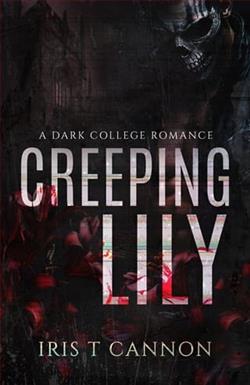Page 22 of Matches and Mistletoe
And he gave me something more than money. Because now I want to put on makeup and my best clothes, and go dancing. I want to have friends over for tea and gossip. I want to take Ellie skating. I want to make cookies and tell the girls stories, and get out my drawing supplies again and sketch an angel’s face. And I want to feel a human man’s hands on me again, his lips on mine.
I want life.
“Mama?” Ellie’s voice behind me. I turn, wiping tears from my cheeks. “Mama, is that money?” she asks.
“Yes,” I say, nodding. “It’s a lot of money.”
“Are you happy-crying because of the money?”
I laugh and pull her close. “Yes, darling, I am.”
She squirms in my arms. “Presents! I have presents! Big ones!”
When I release her, she flies to them, ripping aside the paper.
In one of the packages is a little red coat, just her size. In another, the golden-haired doll from the toy shop in town. She’s speechless, worshipful, touching the doll’s curls and its fingers and its frilly dress.
“Mama,” she says, blinking those blue eyes at me. “Did Saint Nicholas bring these presents?”
“No, darling,” I say, staring out the window at the bright Christmas Day. “I think it was someone even better.”
4
Gammer drew her final rattling breath as the sun rose on the last morning of the year. It was a hazy sun, pink and cold and frosted at the edges, so pretty that Ember wanted to stare at it, but Gammer had warned her that the brightness would scorch her eyes.
Scorched eyes seemed like a less painful fate than facing the shriveled, sunken reality of Gammer’s body on the saggy old mattress. Ember gritted her teeth and tried to squeeze out a few tears—but Gammer had been ill such a long time. Weeks of changing the old woman’s soiled clothes and spooning broth between her wrinkled lips had sapped every soft emotion from Ember’s body. She was cold and frosted at the edges, like the sun.
There was nothing left in the house. No food, no money, no supplies. Nothing but the stock of small boxes printed with the words “Gammer Gray’s Long-Lasting Sulfur Matches” in curling letters. “Extended burn, guaranteed to strike when wet.”
For as long as Ember could recall, the tiny second bedroom of the house had been packed from floor to ceiling with those boxes, but she’d never seen Gammer making any matches. Every time she asked where the matches had come from, Gammer grunted and shrugged.
Over the past three years, since Ember’s eighteenth birthday, the supply of matches had dwindled. The stacks of boxes grew shorter, and no new boxes appeared to replenish the ones Gammer sold when she tottered to town once a month. Gammer had begun to complain that few people in town would buy from her anymore—that she had to go over to the next town, or sell batches to traveling merchants.
Eight weeks ago, instead of going to sell matches, Gammer had collapsed back into bed, muttering and incoherent. Ember had considered making the town trip herself, especially when supplies began to run low, but she did not like to think of the old woman dying alone.
Every time Gammer had traveled to one of the towns, she’d chained Ember to the bedpost and left her there with a bedpan, a cup of water, and some bread. Ember had spent long hours wondering what would happen if some malevolent brigand crashed through the door and discovered her. Would he stab her and leave her to bleed out while he stole what little they had? Would he seize her hair in his fist, kiss her, and tell her he was there to rescue her?
Ember’s thoughts had strayed to many salacious and heart-pounding places while she sat on the floor of the cottage, running her fingers along the edge of the shackle around her ankle. But in her worst moments, she feared that no one would ever come, and that she would shrink to bones and die on the threadbare rug. No one would know or care that she’d gone from the world.
The longest Ember had ever had to wait was three days. At the end of those three terrible days, Gammer had stormed into the cottage and thrust the key into the lock of the shackle, grumbling about witch hunts and how it used to be easier in the old days. “Had to travel farther this time,” was the nearest she’d gotten to an apology, and she had made Ember clean up the mess from the overflowing bedpan.
But that night, Gammer had grown slow and loose-tongued on the contents of a brown bottle, and she’d talked about how she used to be powerful, beautiful, and rich. “I summoned dread things, and I drank their powers,” she’d said. “Sometimes I didn’t fulfill my end of the bargain. And I got away with it too.” She’d choked on a chuckle and insisted that Ember help her to bed.
The very bed she died in, twelve weeks later, on the morning of the last day of Ember’s twentieth year.
Ember wrapped Gammer in bedclothes and took her outside, to the eaves of the forest where there was a half-crumbled stone wall. By chopping a little way into the frozen ground, and by piling up broken stones from the wall, and by covering everything with chunks of brittle snow, Ember got the old woman buried enough. She might have to do the job better in the spring, when the ground thawed. Or maybe she would go and live in the town, and never come back to the cottage again.
Spurred by the thought oftown, Ember layered on the few clothes she had—a thick dress, a scarf, and two heavy shawls. She packed up the rest of the matches and slung the bundle on her back. She knew how much to charge, because Gammer had always grumbled, “Bunch of miserly snipes, those townfolk. Won’t part with five pennies for a pack, nor four. It’s three, or they walk away. A nasty, contentious, superstitious lot. We’re better off without them.”
Ember pondered those words as she stuffed her feet into socks and old boots that leaked knife-sharp cold through cracks in the toes. She mulled over those words as she made hot tea, poured it into a bottle, and trudged away from the cottage, along the faint dip in the snow that marked the trail to town.
Her socks were soaked within minutes, and she chewed her lips, wondering whether she ought to stay in the cottage. But there was nothing left—she had eaten the last of the cornmeal with the last few grains of salt that very morning. There was nothing but tea, a handful of sugar, and the wind whistling sharp and wicked through gaps that she and Gammer had stuffed with straw and rags.
So Ember walked all morning, while the sun ascended, turning crisp and pale yellow in the faded blue sky. She walked under branches laden with snowy froth, and over stone bridges spanning sheets of blue ice. She walked until lines of smoke traced across the pale sky, until dark rooftops and chimneys peeked over the white hills.
Her heart thrilled with terrified excitement. She paused, set down her bundle, and wrapped her head carefully in one of the shawls to conceal the long ringlets of her red-gold hair. According to Gammer, such bright curly hair attracted wicked men.
Gammer had spoken of a street corner where she used to sell her wares—near the town square, across from a baker’s shop. Ember decided to find that same corner and offer up the matches for sale at three pennies a box. Then she would have money.















